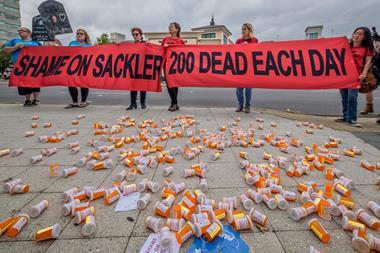Ineos and Purdue highlight sponsorship issues
Petrochemicals firm Ineos has been revealed as the new sponsor of cycling’s Team Sky, prompting accusations that the company is attempting to burnish its reputation and distract from environmentally harmful activities. In the same week, the UK’s National Portrait Gallery rejected a substantial donation from the Sackler Trust – run by the family that owns Purdue Pharma, maker of the opioid painkiller OxyContin (oxycodone). The company’s (and some members of the Sackler family’s) alleged involvement in convincing US doctors to prescribe opioids more freely are being examined in US courts, and some prominent artists had put pressure on the gallery to break its link with the Sacklers.
Corporate patronage of sport and the arts has a long history. Several teams in Germany’s top football league, most notably Bayer Leverkusen, started out as company sports associations, while speciality chemicals firm Evonik now sponsors Borussia Dortmund. Dow Chemical is the ‘official chemical company and carbon partner’ of the Olympic games. Cycling is no stranger to chemistry’s dollar either: a long list of sponsors have graced team jerseys, with teams currently backed by supplement maker Omega Pharma, personal care brand Alpecin and adhesives maker Soudal.
Some of these associations make obvious connections – the alliance between paint and coatings firm AkzoNobel and the Rijksmuseum art gallery in its home city of Amsterdam in the Netherlands, for example. More often, sponsors are driven by more indirect benefits such as brand exposure, prestige and access to hospitality boxes.
Equally, this is not the first time sponsors have been accused of having less-than-pure motives for their patronage. More than a few eyebrows were raised when Amgen (headquartered in Thousand Oaks, California) became the main sponsor of the Tour of California cycle race – given that the company is one of the main manufacturers of erythropoietin (EPO), once the performance-enhancing drug of choice for elite cyclists.
Detractors of the Team Sky–Ineos deal suggest that the team is selling out on its clean reputation, as well as previous environmental pledges like backing campaigns to reduce plastic waste. How is that compatible with sponsorship from a company that produces plastics and wants to develop hydraulic fracturing for shale gas in the UK, they ask.
But Ineos is no beginner in sports sponsorship – it backs a British sailing team that will race in the Americas cup, and in 2015 supported efforts to break the cycling land speed record, as well as running a company-wide charity cycling campaign alongside the 2017 Tour de France.
It’s right to question the motivation behind companies’ patronage, and hold sponsors and recipients to account. But equally, we should judge them by their actions and not necessarily always assume the worst.












No comments yet